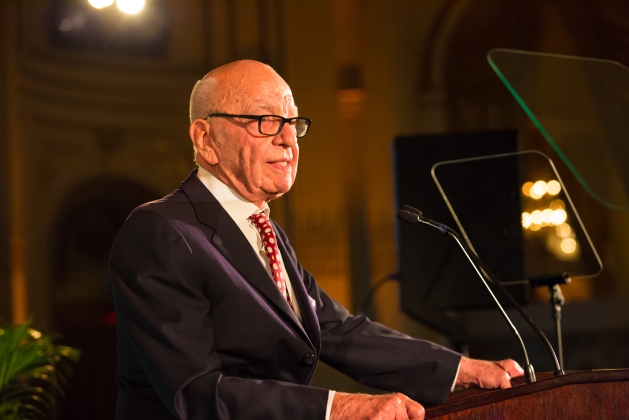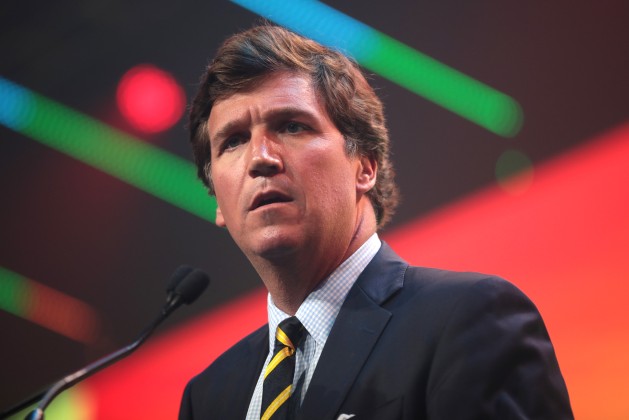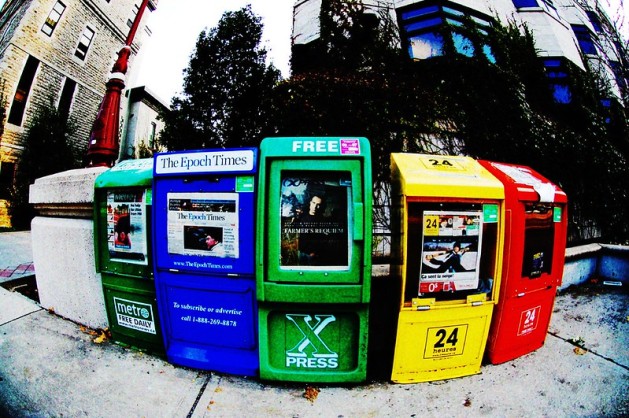
Rupert Murdoch. Photo (cc) 2015 by the Hudson Institute.
Over the past 50 or so years, no one has done more harm to our public discourse than Rupert Murdoch, who announced earlier today that he’s semi-retiring from his position as one of the world’s most powerful media moguls. Since his son Lachlan Murdoch will remain in charge of the family’s various media holdings, as he has been for several years now, today’s news should be regarded as little more than a symbolic moment at which we can take stock, once again, of the damage Rupe hath wrought.
Murdoch, now 92, wields enormous power through his various media holdings in his native Australia, the U.K. and the U.S. Over time, though, that power increasingly has become centered within the Fox News Channel, launched in 1996 as a supposedly conservative alternative to CNN. (MSNBC, founded the same year, didn’t embrace its liberal identity until much later.) Fox News was never what you might call a normal conservative operation — despite initially billing itself as “fair and balanced,” it always trafficked in anger and mudslinging, epitomized by its most popular host, Bill O’Reilly.
Since the rise of Donald Trump, though, Fox News has gone crazy, embracing Trump’s lies about the election, engaging in climate-change denialism, spreading falsehoods about COVID and vaccines, and generally spewing weaponized right-wing propaganda in order to goose ratings and keep viewers glued to the set. I’m not a fan of cable news talk shows as a genre, but at least CNN’s and MSNBC’s are grounded in reality. Fox News lies. It caught up with the Murdochs in 2023, when they agreed to pay more than $787 million to settle a lawsuit brought by the Dominion voting machine company, whose business had suffered at the hands of a smear campaign by Trump insiders, amplified by Fox. That, in turn, led (or seemed to lead) to the firing of Fox’s biggest star, the white supremacist Tucker Carlson.
Through it all, Murdoch came across as the ultimate cynic. Numerous profiles have portrayed him as someone who cares about nothing but ratings and money. He holds Trump in contempt, and he made several attempts to cast him aside — trying and failing to take Trump out during the 2016 presidential campaign and then initially refusing to embrace election lies after Trump was defeated by Joe Biden in 2020. Both times, Murdoch and Fox were dragged back to Trump at the first sign that their ratings might suffer. You might say that Murdoch followed rather than led his audience, but it was a symbiotic relationship. If Murdoch had any courage, he could have weathered the storm, and Fox News might have emerged stronger than ever. As it is, it’s now a wounded behemoth, kept alive by an elderly audience that is averse to digital and without any clear path forward beyond the next few years.
How much does this matter? In recent years, many observers, including me, have blamed our cultural descent into alternative reality and authoritarianism on social media, especially Facebook and to a lesser extent the Platform Formerly Known as Twitter. That may always have been exaggerated, though. In a new piece on polarization for The New York Times, Thomas Edsall places the blame squarely on cable news.
If you want to give Murdoch credit for one thing, it’s that he maintained The Wall Street Journal as one of our three great national newspapers after he bought it. Sure, the opinion section is nutty, but that was true long before Murdoch arrived on the scene. On the other hand, he took a respectable if fading liberal newspaper, the New York Post, in an aggressively downmarket direction after he purchased it in 1976. As a leading retail executive supposedly said when Murdoch complained about the lack of advertising support, “But Rupert, Rupert, your readers are my shoplifters.”
Murdoch’s announcement that he’s reducing his role coincides with the news that the celebrity journalist Michael Wolff is about to release a book titled “The Fall: The End of Fox News and the Murdoch Dynasty.” It is, in a sense, the perfect match: a book by an author who’s often accused of playing fast and loose with the facts writing about an empire built on a foundation of lies. As CNN media reporter Oliver Darcy wrote earlier this week, “Wolff has a history of printing claims that end up being strongly disputed by the subjects themselves.” Still, a book written by a bestselling author that describes one host, Laura Ingraham, as a “drunk” and another, Sean Hannity, as a “moron” is sure to get attention.
This would be an excellent time to say good riddance to Murdoch except that he’s not going anywhere, and it wouldn’t matter that much even if he was. Unlike Rupert, Lachlan Murdoch is said to hold genuinely right-wing views. Thus the House That Murdoch Built will continue to wreak havoc at least for a few more years. I wish I thought that what comes after will be better, but I’m not holding out much hope.
Leave a comment | Read comments









